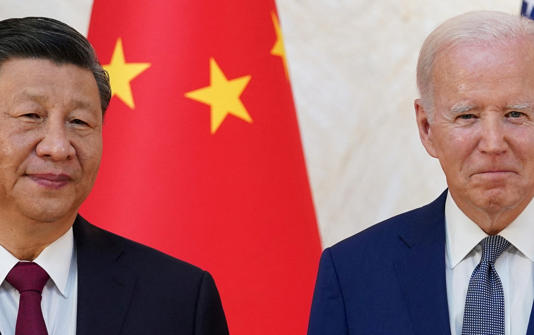Story by Matthew Henderson
While the UK and US, each embroiled in democracy’s perverse consequences, struggle to thwart Putin’s mad ambitions in Ukraine, their respective China strategies face forceful challenge from Beijing. Xi Jinping is pushing brinkmanship to the edge in the Taiwan Straits and doubling down, as in Honduras, on its global efforts to isolate Taiwan.
Meanwhile, leading Western technology companies, alarmed by geopolitical uncertainty and facing hostile data “legislation,” are marching out of China in droves. Microsoft has already taken LinkedIn out and is moving an expert AI team to Canada to avoid local pressure on them.
Sub-par performance by the best-known Chinese stocks are compelling some seasoned Western asset managers to cut their exposure. Where is this debacle leading, and where might it end?
Risk has been defined as exposure to hostile intentions and capabilities. This dictum omits one vital issue: whether the party at risk is aware of what is going on. Arguably much of the “free” world is either ignorant, or in denial, about Xi Jinping’s policy drivers, intentions and capabilities.
This in itself is acutely risky. A tipping point in China Risk is rapidly approaching, and with it an opportunity to turn this to the West’s advantage.
Xi Jinping is forging ahead with plans for a revisionist New Era in which China becomes the sole super-power in an authoritarian, post-democratic world order. His immediate tactics include expedient alliances with other enemies of the West to defeat sanctions and other preemptive counter-measures short of military conflict.
He is striving to exploit Western political and economic division and disarray, not least through his tacit support for Putin’s illegal invasion of Ukraine. His spuriously neutral Ukraine peace initiative lacks substance – indeed, this may be deliberate – but it symbolises his ultimate aspiration to global authority.
However, Xi is still a long way from achieving this. Though propaganda trumpets China’s triumph over the Covid virus and prospects for renewed growth, part of Xi’s aggressive haste stems from the realisation that the Chinese Communist Party state remains riddled with vulnerabilities.
China rapidly globalised its economic influence by exploiting the West’s illusion that, once admitted to the World Trade Organisation (WTO), it would engage in trade according to WTO rules and norms. But from the outset it denied foreign businesses free and fair access to its domestic market and used massive state subsidies to capture market dominance for its own products and systems across the world.
From 2018, the US has led a de facto trade war against this, while remaining uncomfortably tied to the Chinese economy by enduring debt and supply-chain dependencies.
Subsequent geopolitical and economic tensions have progressively worsened due to China’s human rights abuses, political interference, cyber espionage and IP theft, mistrust and sourcing disruption caused by the pandemic, alignment with Russia, and threats to Taiwan.
This has led to an accelerating exodus of major Western companies from China to more reliable regional bases in South-East Asia, India and Bangladesh. The low cost of factory labour in China, formerly a major draw for FDI, no longer applies. Factory wages in South China are now around three times higher than in equivalent South Asian industries.
The Chinese economy has long been struggling under Xi Jinping’s Marxist ideological chokehold. Covid lockdown early in the pandemic was a kneejerk CCP crisis management response to potential social disturbance. Imposed disastrously late, it slowed transmission but failed to boost immunity.
“Zero Covid” proved powerless against the omicron variant but was not abandoned until the export-led national economy had been badly damaged by needlessly-prolonged coercive lockdowns.
Unsurprisingly, promised recovery has not been realised. Exports are depressed and the property market is in disarray, with more and more major players being delisted on the Shanghai stock exchange. The tech sector remains traumatised by Xi’s politically-motivated crackdown in 2021, which has wiped out many jobs for educated young workers at a time of serious youth unemployment.
Debt remains toxic, demographics are intractable (despite a huge surge in mortality among the under-immunised elderly soon after Zero Covid rules were abruptly relaxed). Environmental stresses, particularly water security, are worsening.
Seemingly ignoring these headwinds, Xi Jinping’s model for economic resurgence is a distinctly ideological formula called the Dual Cycle economy. The idea is to stimulate domestic technical innovation and production, leveraging this to give China a lead in global markets for cutting-edge technologies, while concurrently driving down dependency on technical cooperation with the West.
This construct ties in existing nationalist, anti-market measures and a protectionist, sanction-proofing subtext, sitting badly with claims that China is now open to the world for “business as usual”. Recent use of arbitrary data-protection legislation to seize records, detain staff and freeze important ESG and other compliance work done by foreign consultancies in Shanghai and elsewhere also undermines this claim.
Xi is hoarding gold, securing energy supplies and building up China’s military capabilities, in particular those used to threaten Taiwan. To argue that he will not, for some time at least, invade Taiwan for fear of the economic consequences misses the real point.
Xi would prefer to annex Taiwan without a fight, but he needs to be able to flex enough military muscle to undermine US support to the point that the Taiwanese lose faith in it and accept the inevitable. But this will not pay for itself, and scaring off FDI won’t fill any coffers.
Xi shows little capacity to tackle the fundamental unsustainability of the Chinese economy. Failure to do so could sweep away his dreams of a revisionist New Era. There has been much talk lately of “de-risking” from China. This is a two-way process; it should entail renewed, concerted economic pressure, including enhanced sanctions, against a regime that is already far more of a global threat than Russia.
As an Indian commentator has observed, the imperative is to reinforce national power and work in step with China’s sole global “balancer,” the US. The “Atlantic Declaration” is welcome; now it needs to grow some teeth.

